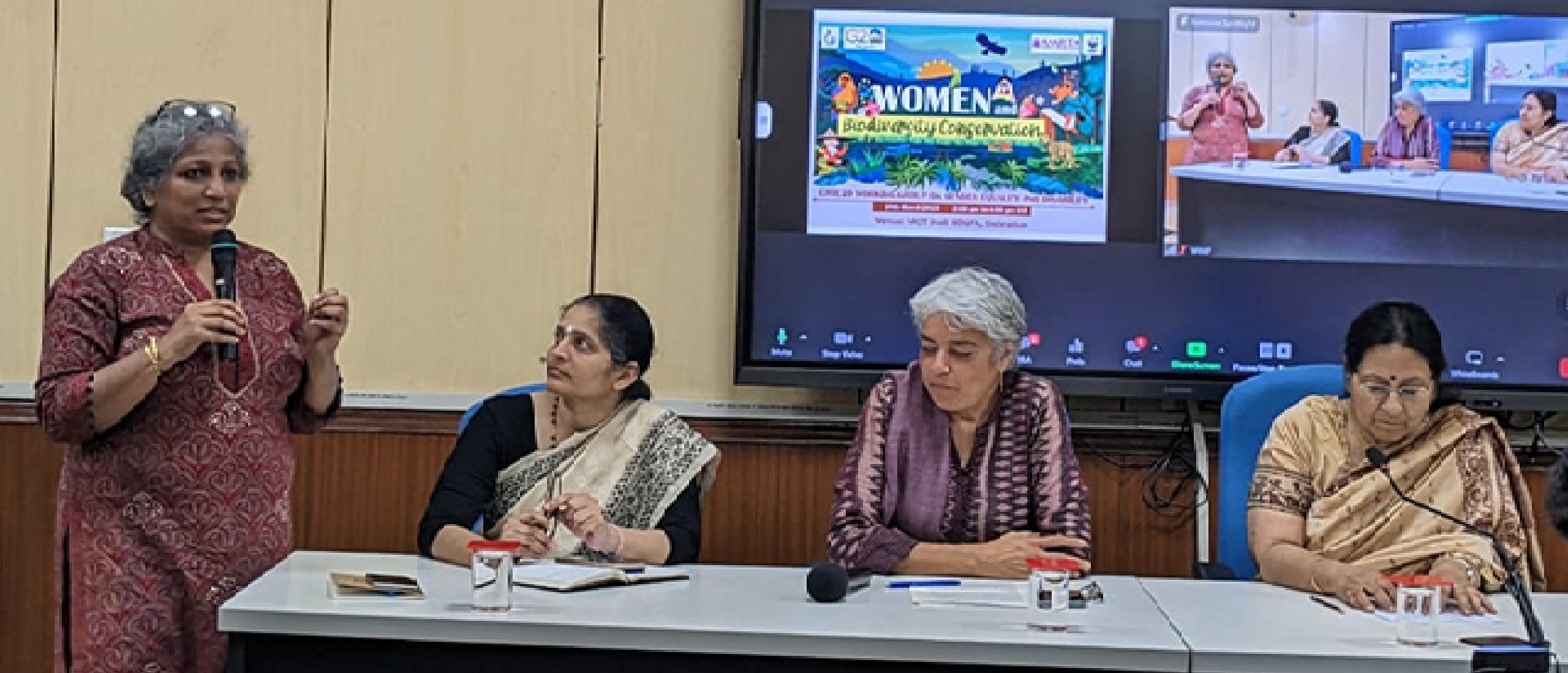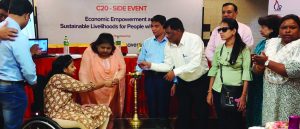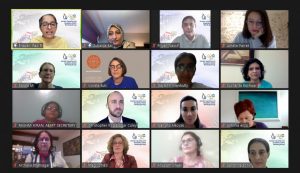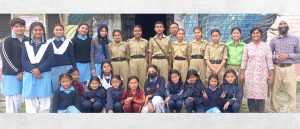The C20 Gender Equality and Disability Working Group (GED WG) held a side event on “Policy discussion on Women in Biodiversity and Conservation” on March 28, 2023 from 2:00 pm to 4:00 pm IST. The event was held at IGNFA, Dehradun, in a hybrid mode. There were 52 in-person participants and 50 online participants. The program was primarily organized by WWF-India.
To goal of the program was to bring together experts in the area of women in biodiversity and conservation, to recommend policies, and highlight best practices that represent the voices of civil society. Among the participants were representatives of academic, national and international NGOs, and Community-Based Organisations (CBOs).
The program started with comments by accredited panellists:
- Welcome remarks by Ms Vishaish Uppal, Director, Governance, Law and Policy, WWF-India
- Opening address by Prof. Bhavani Rao R, Dean, School of Social and Behavioral Sciences, Amrita University
- Keynote address by Ms Melissa de Kock, Head, Biodiversity, People and Landscapes Unit, UNEP
As part of her welcome remarks, Ms. Vishaish Uppal invited local women in the audience to share their views. Several women spoke briefly in Hindi about the need to think of human and animal life together, to make pledges towards community and environmental development plans, to maintain greenery in villages, to maintain land, and to progress together.
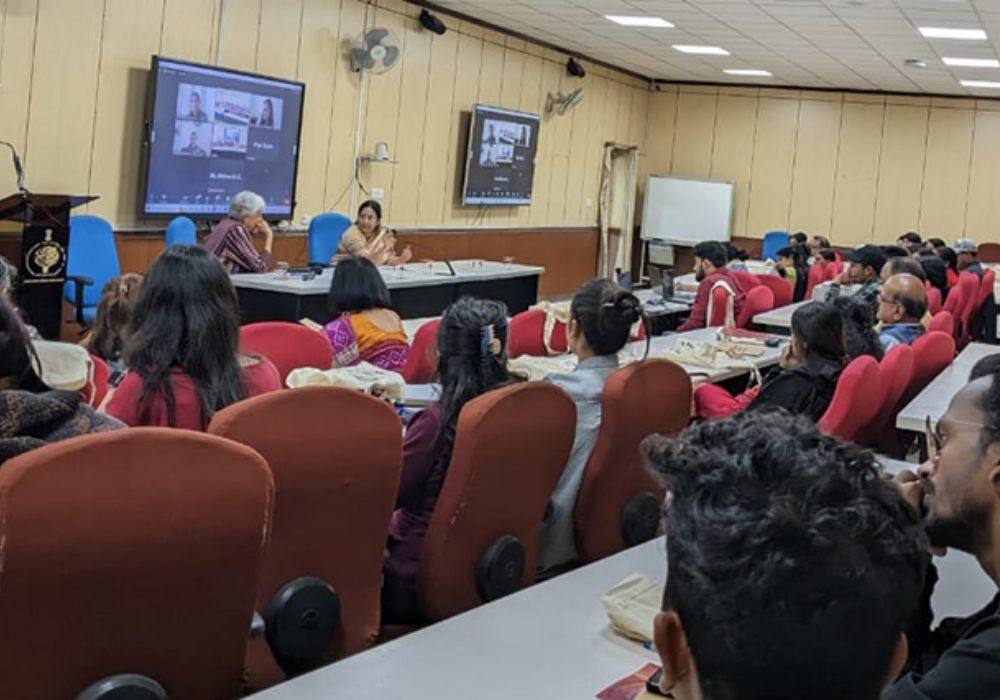
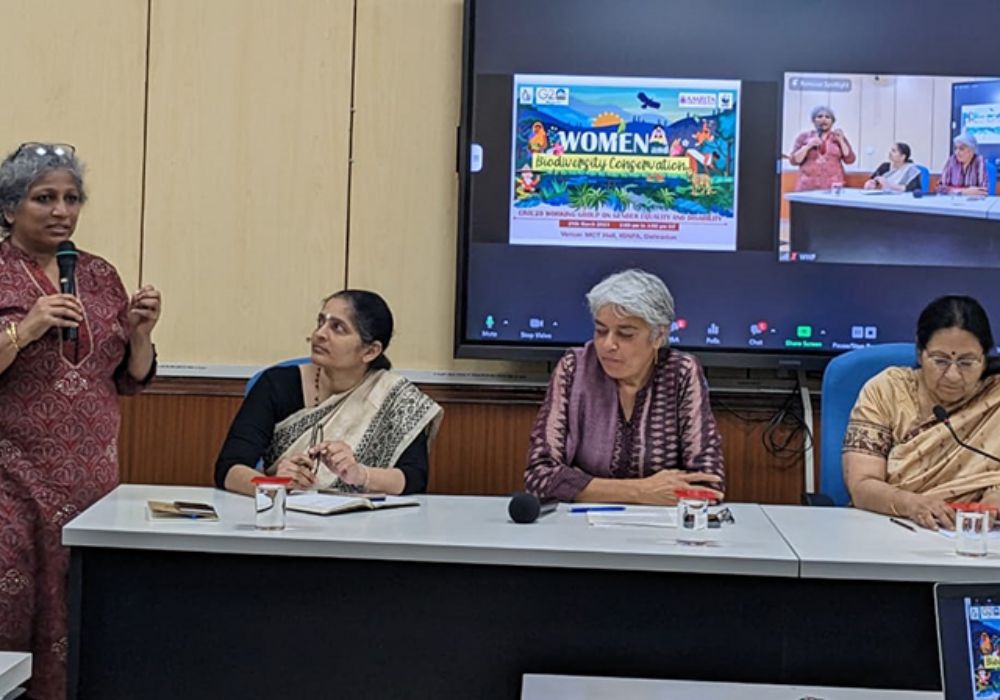
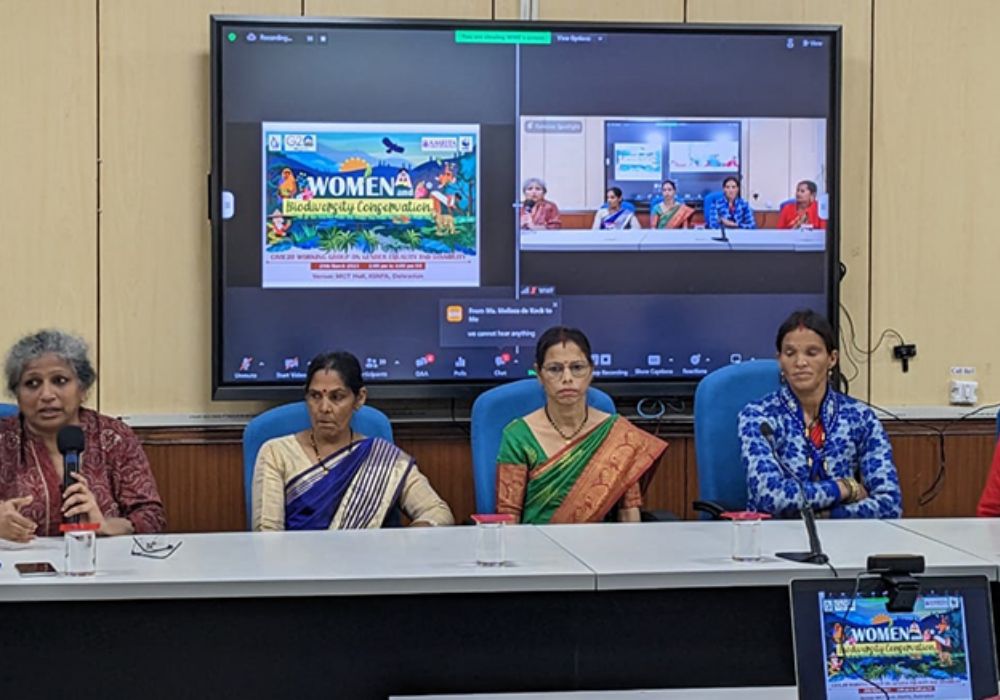
In her opening address, Prof. Bhavani Rao spoke about the G20 focus on the environment. She explained the tagline: “you are the light”, and elaborated on the expected outcomes of the program, and the need for strong and relevant recommendations, not just for India, but for all the G20 countries. She directed focus towards ways that women can contribute towards the C20 agenda across all the 8 sub-themes of the GED working group. She gave examples about Amma, about women’s role in maintaining biodiversity, and about living in harmony with nature in traditional ways. She expressed hope to gain insights through the program about ways to promote traditional biodiversity practices in ways aligned to today’s scenario.
In her keynote remarks, Ms Melissa de Kock, Head of Biodiversity, People and Landscapes Unit, UNEP, in Nairobi noted the importance of women’s empowerment and the need to improve women’s efficiency. She provided examples of women’s engagements in different policies, programs, and conventions. She provided examples of positive things happening with women in policy-making, different initiatives, and gender action planning. She spoke about her admiration of Wangari Maathai, the first African woman to receive the Nobel Peace Prize. She spoke of the duty to mentor and upskill women.
The moderator, Dr Sejal Worah, Programme Director, WWF-India, led an engaging conversation among 5 panellists. One panellist, Smt Revati Devi, was dropped from the meeting without speaking. The other 4 panellists were:
- Dr Neelima Jerath, Director General Pushpa Gurjal Science City – Punjab
- Ms Alice Ruhweza, Senior Director, Policy Influence and Engagement, WWF-International
- Ms Sruti Ajit, Programme Officer, Women4Biodiversity, India
- Dr Purnima Devi Barman, Senior Project Manager, Aaranyak, Assam
The panellists shared their experiences, inspirations, thoughts about best practices, and policy recommendations. The discussions initially revolved around the experiences of women working in biodiversity, the differences between past and present experiences in the field, and mainstreaming women in biodiversity. The speakers provided their insights, overall noting that things are improving in terms of women’s inclusion in biodiversity, but that there is still a long way to go. The moderator asked about inspirations and sought recommendations for good socio-cultural aspects of biodiversity. The speakers brought diverse perspectives and spoke about a range of inspirations and good practices.
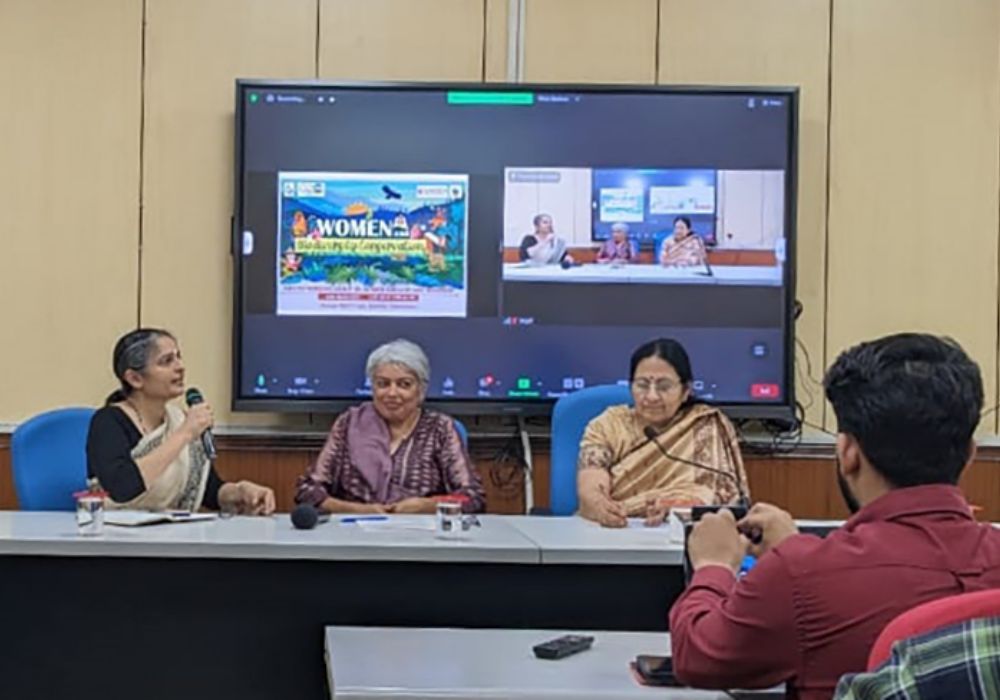
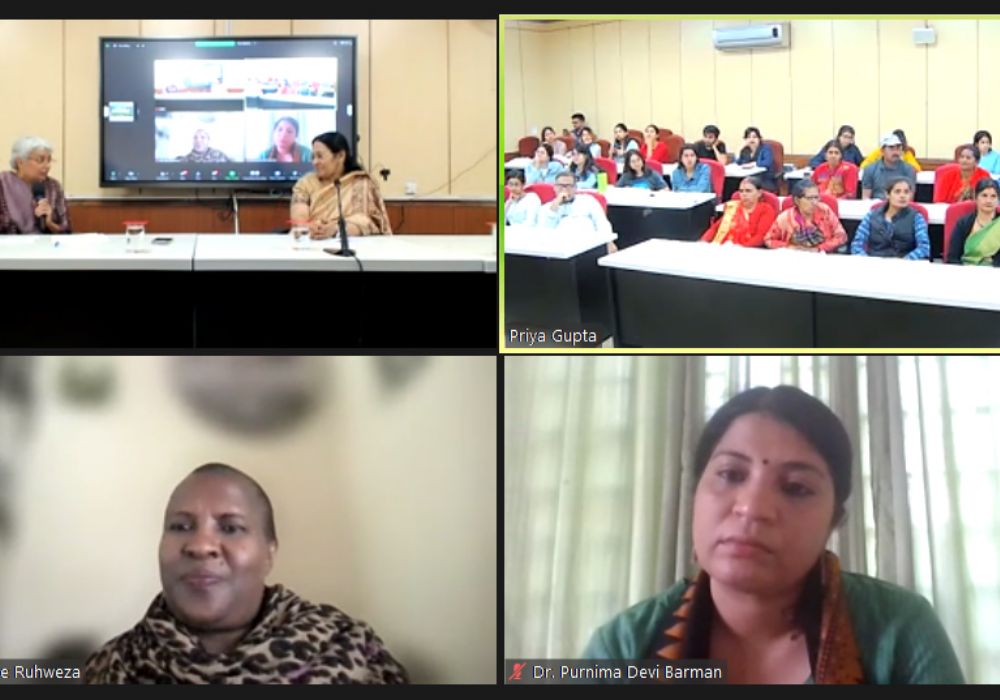
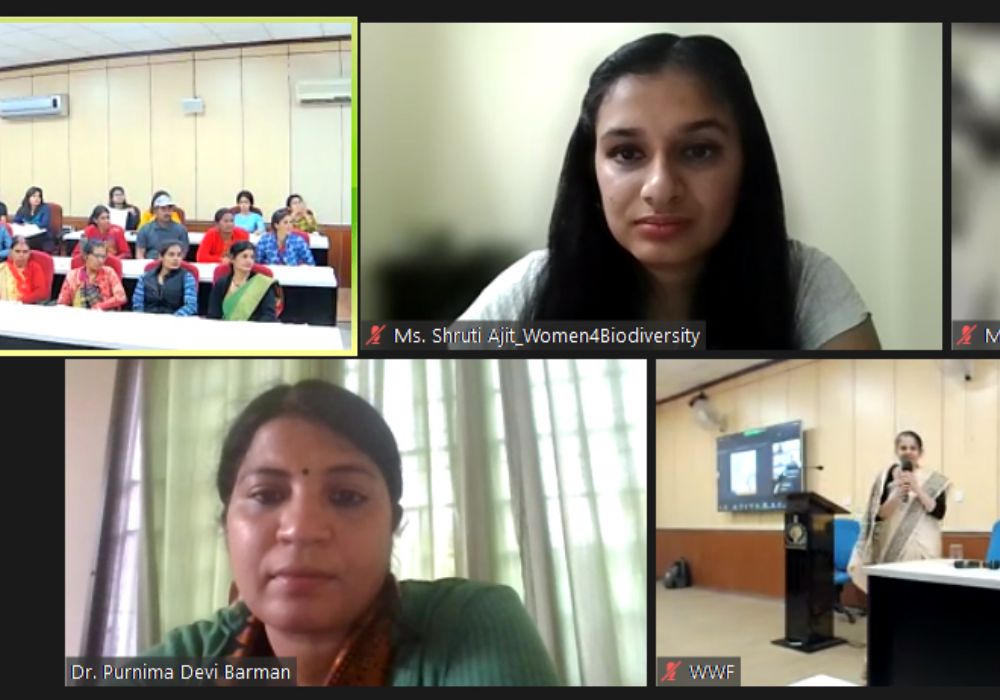
Dr Jerath spoke about her admiration of several women who are not formally educated but work for the environment and themselves. She spoke of traditions like mothers giving new daughter-in-laws seed packets. She identified the Sangham women’s group in Zahihabad, Hyderabad that won the India Biodiversity award, Equator award, and Nari Shakti Puraskar.
Alice Ruhweza spoke about her inspiration from her father, and about the cultural values of women. She noted that women sometimes don’t want to be seen at the forefront, and the need for collaborative community efforts that also include men. She ended by stressing the need to tell the stories of women.
Dr Purnima spoke about her Hargila Army which includes 10000 inspired people to get involved in environmental protection, and turned into a revolution, becoming a people’s movement. The group of rural women in Assam work to protect one of the world’s rarest storks: the hargila. They do rituals like Godh Bharai (baby shower) of hargila, and offer prayers and prasad for the hargila group. The local women make clothes, jewellery, and scarves, integrating Hargila designs into traditional dresses, which serves as a good udhaharan for biodiversity and income generation.
Sruti Ajit spoke about traditional knowledge and the need for transformative education, with focus on conservation, local biodiversity, and citizen science. She suggested that traditional knowledge with transformative education can help future generations. She spoke about adivasi people who treat the forest as their child, understand that their sustenance is linked to the forest, and include biodiversity in their livelihood. She stressed the importance of localizing food systems, and implementing women’s rights (forest rights, community land rights, inclusive rights, gender-specific laws, and gender-based violence).
This event highlighted an array of issues regarding women in biodiversity. It highlighted some good practices. The moderator closed with a series of questions and suggestions about how to get women’s stories out, how to get others to listen, how to create safe spaces for women, and how women should support each other and find collectively find a way to get the voices out. She suggested that this should be done at all levels, the family level, community, state, and global levels, noting that the global pace may be too slow, and needs to be faster. She closed by thanking the men for listening and acting on these issues. She urged everyone to act for society.
Prof. Bhavani closed the program by highlighting the Million Lights initiative.
Poster